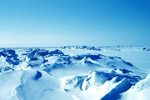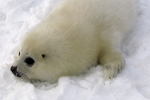Dutch police arrested 31 Greenpeace activists today, who were attempting to block the Russian oil tanker, Mikhail Ulyanov, from delivering the first shipment of offshore Arctic oil to the European market. Greenpeace opposes drilling in the Arctic due to the difficulty of cleaning up any oil spill in remote, ice-filled waters, and the exacerbation of global climate change from exploiting new fossil fuel sources.
Among those arrested was the captain of the Greenpeace flagship, the Rainbow Warrior, who last year spent months in a Russian prison along with 27 other activists and two journalists for protesting the country’s Arctic oil drilling scheme. Seven other activists from the so-called “Arctic 30” also took part in today’s action.
At the Rotterdam Port, activists painted “No Arctic Oil” on the Russian oil tanker’s side, while others in inflatable boats blocked the tanker from initially offloading the oil.
The oil comes from the Prirazlomanaya platform in the Pechora sea off the northern coast of Siberia. The platform is run by Russia’s state-owned company, Gazprom, and is the first in the world to drill into the Arctic sea bed for oil.

Greenpeace blocking the Mikhail Ulyanov from docking. Photo by: Reuben Neugbauer.
The captain piloting the Mikhail Ulyanov, Stanislav Chichin, told Associated Press that Greenpeace had put the ship’s safety in jeopardy.
“Maneuvering in the confined waters of a port is no less dangerous than sailing in the Arctic, especially when another vessel is trying to interfere with a tanker transporting 67,000 tonnes of crude oil in an area of high intensity shipping,” Chichin said.
Dutch police eventually arrested the activists involved in the blockade as well as Greenpeace Captain Peter Willcox. The oil tanker is now docked at Rotterdam and unloading its oil.
“The oil industry and governments are sparing no expense and going to the most difficult, most out of the way places on the planet just to prop up yesterday’s energy source,” Greenpeace writes in a blog. “Breaking this chain is not just an environmental imperative, it is a matter of peace and security. The fight to stop Arctic oil drilling is one of the defining battles of our time.”
According to the Intergovernmental Panel on Climate Change (IPCC) society can only burn 800-880 gigatonnes of CO2 if governments are to keep their pledge of making sure global temperatures don’t rise more than 2 degrees Celsius. Sixty percent of this “carbon budget” has already been burned by 2011, or 530 gigatons. This means many of the known sources of fossil fuels must be left unexploited.
Related articles
Europe votes for an Arctic Sanctuary
(03/13/2014) Yesterday, the European Parliament passed a resolution supporting the creation of an Arctic Sanctuary covering the vast high Arctic around the North Pole, giving official status to an idea that has been pushed by activists for years. Still, the sanctuary has a long road to go before becoming a reality: as Arctic sea ice rapidly declines due to climate change, there has been rising interest from governments and industries to exploit the once inaccessible wilderness for fish and fossil fuels.
From seals to starfish: polar bears radically shift diet as habitat melts

(04/07/2014) One of the most iconic species of the ongoing climate change drama, polar bears have dropped in numbers as their habitat melts, with previous estimates forecasting a further 30 percent reduction within three generations. However, their situation may not be as dire as it seems.

(03/31/2014) It’s not just melting glaciers and bizarrely-early Springs anymore; climate change is impacting every facet of human civilization from our ability to grow enough crops to our ability to get along with each other, according to a new 2,300-page report from the Intergovernmental Panel on Climate Change (IPCC). The massive report states definitively that climate change is already affecting human societies on every continent.

(02/24/2014) An assessment of ocean acidification, presented at the UN Climate Change Conference in Warsaw in November 2013, starkly concluded that acidity is on track to rise 170 percent by the end of this century. As many key species are sensitive to changes in acidity, this would drastically impact ocean ecosystems, with effects especially pronounced in polar regions where the cold waters intensify acidification, and which are home to many organisms that are particularly vulnerable to acidification.
Shell drops plans to drill in the Arctic for now
(01/30/2014) Facing plunging profits, Royal Dutch Shell has announced it will cut exploration and development funding by nearly $10 billion this year, including halting their long-suffering plans to drill in the Arctic ocean. Shell’s new CEO, Ben van Beurden, made the announcement yesterday that controversial plans to drill off the Alaskan coast will be put on hold for another year.
Underestimating global warming: gaps in Arctic temperature data lead scientists and public astray

(01/15/2014) No place on Earth is heating up faster than the Arctic, but just how fast has remained an open question due to large gaps in temperature data across the vast region. Now, a recent study in the Quarterly Journal of the Royal Meteorological Society finds that not only is the Arctic warming eight times faster than the rest of the planet, but failure to account for temperature gaps has led global datasets to underestimate the rise of temperatures worldwide.
World first: Russia begins pumping oil from Arctic seabed
(12/23/2013) Oil has begun to be pumped from the Arctic seabed, according to Russian oil giant, Gazprom. The company announced on Friday that it has begun exploiting oil reserves at the offshore field of Prirazlomnoye. The project, which is several years behind schedule, is hugely controversial and made international headlines in September after Russian military arrested 28 Greenpeace activists protesting the operation along with a British journalist and Russian videographer.
Russia charges imprisoned Greenpeace protestors with hooliganism, instead of piracy
(10/24/2013) Russian investigators announced on Wednesday they are dropping piracy charges against 28 environmental activists and two freelance journalists who have spent a month in custody since they were seized aboard Greenpeace’s boat, the Arctic Sunrise.
Russia charges non-violent activists with ‘piracy’ for protesting Arctic oil drilling
(10/07/2013) In what is being described by Greenpeace as an ‘imaginary offense,’ Russia has charged 30 people with piracy after activists protested against oil exploitation in the Arctic. The 30 charged included not only protestors, but a British journalist and Russian videographer who were on board Greenpeace’s ship, the Arctic Sunrise, when it was stormed by the Russian military late last month.
‘Heading towards an ice-free Arctic’: sea ice extent hits sixth lowest on record

(09/18/2013) Sea ice cover in the Arctic shrank to one of its smallest extents on record this week, bringing forward the days of an entirely ice-free Arctic during the summer. The annual sea ice minimum of 5,099m sq km reached on 13 September was not as extreme as last year, when the collapse of sea ice cover broke all previous records.
Climate change killing harp seal pups

(08/20/2013) As sea ice levels continue to decline in the northern hemisphere, scientists are observing an unsettling trend in harp seal young mortalities regardless of juvenile fitness. While a recent study found that in harp seal breeding regions ice cover decreased by up to 6% a decade from 1979 on, a follow-up study in PLoS ONE compared the rate of harp seal strandings to total ice cover from 1992 to 2010.
(07/30/2013) Rapid thawing of the Arctic could trigger a catastrophic “economic timebomb” which would cost trillions of dollars and undermine the global financial system, say a group of economists and polar scientists. Governments and industry have expected the widespread warming of the Arctic region in the past 20 years to be an economic boon, allowing the exploitation of new gas and oilfields and enabling shipping to travel faster between Europe and Asia.
Featured video: How climate change is messing with the jetstream
(05/08/2013) Weather patterns around the globe are getting weirder and weirder: heat waves and record snow storms in Spring, blasts of Arctic air followed by sudden summer, record deluges and then drought.